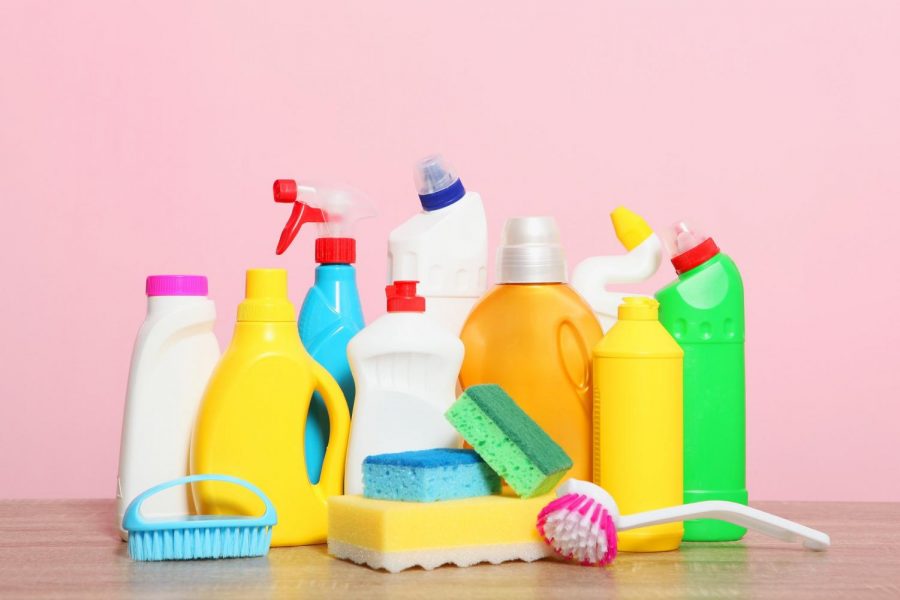The Dirty Truth Behind Household Cleaning Products
With everything going on, I thought it’ll be important to inform others on how improper use of cleaning supplies at home can be dangerous to your health and even deadly.
Meticulously cleaning our homes has become a national pastime, but it’s important to remember that many of the cleaning agents we use can be hazardous when used incorrectly.
For one, spraying yourself or others with Lysol, or mixing cleaning products together, are dangerous and kind of stupid.
Lysol is made for surfaces not human skin and clothes. Don’t kill yourself trying to keep the germs away. Washing your hands and showering is fine.
There are more toxic cleaning products than we think.
Have you ever considered how odd it is that there are warning labels on cleaning products? I mean, aren’t they supposed to be ridding your home of bad stuff, and not adding to it? More likely, making you sick.
Here’s the kicker, the labels on cleaning products don’t even tell you about most of the nasty stuff that’s inside them.
So if these products are as safe as they’re claimed to be, why don’t the companies tell us what’s in them?
Call me suspicious, but it’s weird.
I mean, all these products ever say is “don’t put near eyes and mouth” or “don’t let near children” I mean, duh.
Who in the hell would even want to do that, but hey, we know it’s dangerous stuff, but there are other levels of danger.
Everyone is going crazy over products that might kill them, it’s nuts.
I know it scares everyone and I understand; I am too, but times are tough right now and the last thing we need is people dying off of cleaning products. Haven’t we had enough deaths this year? The year isn’t even over yet.
I mean, you can’t even get a freaking can of Lysol anywhere. I literally check everywhere.
There are even people camping out in front of 24 hour stores, waiting for their delivery on cleaning products, not Jordans, not the new iPhone, cleaning products.
You probably already knew this, but products like chlorine bleach can cause severe irritation to the eyes and skin, and its vapor or mist can cause damage to the respiratory tract and aggravate asthma, emphysema, chronic bronchitis, and other respiratory conditions.
Many degreasers contain butyl cello solve, a chemical that irritates mucous membranes. May also cause kidney or liver damage or depress the nervous system.
Most dishwashing liquids include petroleum-based surfactants that stay around in the environment and fragrances stabilized with phthalates.
Disinfectants may contain any of several toxic chemicals, including formaldehyde, cresols, ammonia, phenols, and chlorine bleach, which should be kept away from the skin. Some of which can be hazardous to internal organs and the central nervous system.
One of the most dangerous products found in the home is drain cleaner. Ingredients often include lye and sulfuric acid, both of which are severely caustic and corrosive to skin, airways, and eyes.
Floor and furniture polish usually contain cresols and petroleum distillates, which are toxic chemicals that can cause skin and eye irritation, along with damage to the central nervous system. Fragrance includes phthalates and vapors, which can contaminate indoor air for days after use.
Some glass cleaners contain ammonia, a poison that can irritate skin, eyes, and the respiratory system. Some also contain butyl cellosolve, which is potentially toxic.
Many laundry detergents contain synthetic surfactants; fragrances can cause skin irritation and allergic reactions and often contain phthalates.
Mold and mildew removers are essentially a mix of water and bleach, and other chemicals such as butyl cellosolve, with their inherent danger to the respiratory system.
Oven cleaners are dangerous because they can contain lye which can cause severe damage to eyes, skin, mucous membranes, mouth, throat, esophagus, and stomach. Aerosol versions are easily inhaled. They can be fatal if swallowed.
Many scouring cleansers contain butyl cellosolve, which can irritate mucous membranes and cause liver and kidney damage. Brands also contain chlorine bleach and silica, an abrasive that can be dangerous if inhaled.
Lots of toilet cleaners can contain chlorine and hydrochloric acid, among other chemicals, which can be harmful.
Tub, tile, and sink cleaner contain chlorine and may contribute to the formation of organochlorines, a dangerous class of compounds that can cause reproductive, endocrine, and immune system disorders.
This isn’t even all. I can not make this up. So before you buy 10 packs of the same products, be advised of what’s in them and be very careful. Don’t accidentally poison yourself trying to keep your house clean.

Amber Perez is half Puerto Rican and half Italian. She is currently residing at The Bronx, New York and enjoys listening to music and reading books about...








